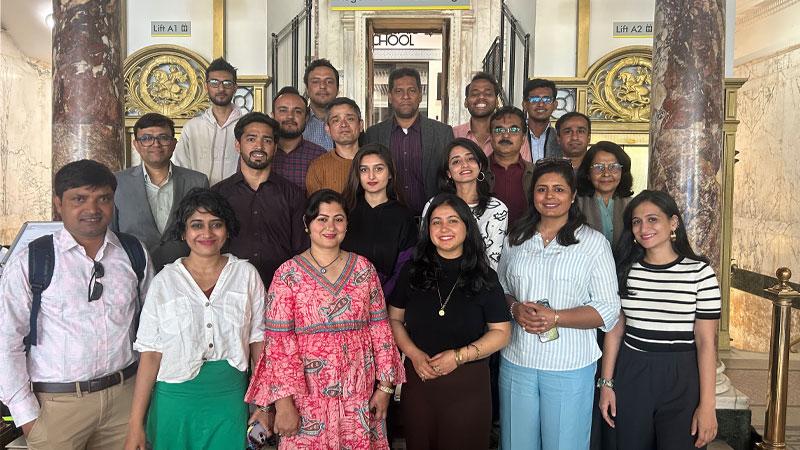The University of Westminster welcomed twenty journalists from countries in South Asia as part of the Chevening South Asian Journalism Programme (SAJP), an eight-week fellowship connecting mid-career journalists with leading media organisations in the UK.

The Foreign, Commonwealth and Development Office (FCDO)-funded fellowship is open to journalists from South Asian countries including Afghanistan, Bangladesh, India, Pakistan, Sri Lanka and the Maldives. Titled Good Governance in a Changing World: The Media, Politics and Society, this year’s fellowship explored the different ways the media plays a part in holding democratic processes to account.
Throughout May and June, Fellows attended lectures and discussions at the University and beyond to explore the range of journalistic approaches undertaken by the UK and the South Asian region, before using that knowledge to tackle issues facing the field, such as misinformation, AI-generated content and autocracy. Fellows were also introduced to academics, media and political figures, as well as peers in some of the UK’s top media organisations.
The eight-week programme concluded with the annual SAJP symposium on a topic chosen by the Fellows. This year the group focused on the theme of South Asia at a Crossroads: Media, Power and Authoritarianism. The group examined critical questions facing the media in the region’s volatile political landscape, including the role of responsible journalism and how technology is used to survey and silence dissent.

Photo credit: Rubatheesan Sandran
Led by Co-Directors Eleanor Weber-Ballard and Professor Jean Seaton, Professor of Media History, alongside Research Associate Vijayta Lalwani, the SAJP has been hosted by Westminster’s School of Media and Communication since 2012.
One Fellow who took part in the programme was Smitha TK. She said: “As a journalist from India, it’s usually impossible to sit with a fellow Pakistani journalist and discuss politics. The highlight of this programme is how during a war back in our home countries, we were all together and found solidarity by helping each other bust misinformation. We have a lot of similarities and there’s a lot of solutions we can borrow from each other, even as journalists working in this very autocratic world right now.”
Another Fellow, Adrija Bose, added: “When the India-Pakistan war broke out, we were all helping each other bust misinformation. My team in India were working on a fact-checking story, so I reached out to a Pakistani Fellow who put me in touch with someone, and we were able to factcheck the story. My team were able to do that back in India because I met someone here and we could see the impact right now; it was unfolding in front of our eyes.”

Adrija Bose chairing a panel on Democracy Under Watch at the symposium. Photo credit: Rubatheesan Sandran
About the programme Professor Seaton said: “This year the unique South Asian Journalists Programme, bringing together twenty high-flying journalists, took place as a conflict broke out between India and Pakistan and escalated unpredictably. At a distance from their own newsrooms and families, as a blizzard of disinformation confused the conflict, the Fellows brought a professional seriousness to dealing with the news. They had come for intense weeks of lectures, meetings, trips, fun, theatres, galleries — from The Economist, Bristol Cable to the BBC (where they were privileged to meet Samir Shah, the Indian born Chair of the Corporation — but the value of the cross border contacts was clear, even at difficult moments. We all learn. We were all honoured to share such testing times with the Fellows.”
Alex Saray, Chevening Fellowships Programme Officer at the British Council, commented: “The SAJP fellows have taken advantage of every moment they’ve spent in London; academically, professionally, and personally. At the Chevening Secretariat our mission is to bring the best talent, and this cohort is a clear example of that – we are continually inspired by their passion and commitment to their profession and their countries. We hope their participation in this programme will leave them with a long-lasting and positive impression of the UK, and that they will keep us informed of their future achievements!”
The SAJP directly contributes to the United Nations Sustainable Development Goals (SDGs) 16: Peace, Justice and Strong Institutions and 17: Partnerships for the Goals. Since 2019, the University of Westminster has used the SDGs holistically to frame strategic decisions to help students and colleagues fulfil their potential and contribute to a more sustainable, equitable and healthier society.
Find out more about studying Media and Communication courses at the University of Westminster.
Learn more about the University’s Global Partner Network in South Asia.







